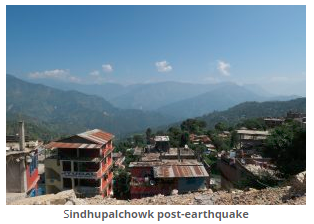Analysis
Bonded Labor and Abduction in Sindhupalchowk
2016-06-08

This entry highlights a case of bonded labor that Nepal Monitor.org staff witnessed firsthand in the district of Sindhupalchowk. In early October 2015, a team comprised of staff from MISEREOR Germany, Nepal Monitor, and COCAP traveled to Sindhupalchowk to follow up on aid distribution after the April and May earthquakes. While meeting with local employees of the Women and Children’s office, employees responded to a report of a woman and her infant being held against her will in the village of Khadichaur. NepalMonitor.org staff accompanied the Women and Children office’s team to Khadichaur and observed the team in action, discovering that the woman was being forced to work at a hotel to pay off debts that she and her husband had accumulated in order to pay for medical bills for their child. The hotel owner allegedly kept her infant captive so that the woman would not attempt to leave without working to pay off the enormous debt of roughly 35,000 rupees. It is unclear whether or not she was sexually assaulted. The woman stated that she was twenty-one years old, but later admitted that she did not know when she was born and could have been a minor.
By December, the case was filed with the district court in Chautara, and the hotel owner was put in jail for two months. The woman and her child were brought to Shakti Samuha shelter in Kathmandu, an agency that works to reduce, prevent, and mitigate the effects of human trafficking via outreach, rehabilitation, and advocacy. The woman received counseling and legal support, shelter, clothing, medical treatment, as well as childcare. Shakti Samuha’s rehabilitation center also provides skills training for women to help them find employment doing tailoring, and making other handicrafts such as shawls and jewelry. The center also worked to locate the woman’s husband and family members.
From observing the situation and discussing the case with a Shakti Samuha lawyer, this has all the appearances of bonded labor, known as harua charuwa in Nepal. Haruwa charuwa is essentially modern day slavery, with men working as farmers, and women and children herding cattle and working as servants. Living in poverty, if a family is to encounter an emergency situation such as the victim from Khadichaur did, there is little choice but take out a loan from a landlord and then be forced into working until the debt is paid off. With high interest rates and low wages, it can take families years to pay off debts, which can be passed down to the next generation. According to a survey conducted by Freedom Fund, there are approximately 97,000 haruwa-charuwa adults and 13,000 children who were engaged in forced labour across the country. Additionally, nearly all families surveyed indicated that they had experienced violence in some way, and lacked sufficient food.
According to the Shakti Samuha lawyer who discusses this case with us, these cases of bonded labor are more common in the Eastern part of the country, but there are other forms of bonded labor throughout Nepal. In the mid-Western Terai, kamaya affects agricultural workers, mainly from the Tharu community who borrow money from their landlords. In the far west, the haliya system affects 20,000 people in far Western hills of Nepal. Unfortunately, the debt hardly decreases because the debtors are charged for more food and shelter and receive such low wages. While both haliya and kamaya have been officially abolished by the government of Nepal in 2008, the practice has been difficult to completely eradicate, and the problems workers and their families face still persists.In discussing the woman’s case further, Shakti Samuha assisted the woman in filing charges against the hotel owner. While Shakti Samuha staff felt that this was a case of bonded labor and kidnapping, the government and police officials involved thought that abduction was a more appropriate charge. However, the Shakti Samuha lawyer was not optimistic about the woman’s case, as they were having a difficult time in finding local witnesses who will corroborate the woman’s story. They have also been receiving threats and harassing calls from friends and family of the perpetrator. The maximum sentence the perpetrator could receive is 10 to 12 years in prison, as well as compensation to the victim. Around December, the victim was being represented by a lawyer from the Legal Aid and Consultancy Center in Nepal, as well as the public district attorney.
Shakti Samuha staff managed to locate her husband in January and she and her child have since left Shakti Samuha. The case is still ongoing in the district court, and no verdict has yet been reached. While the ordeal that this person has undergone is extremely difficult, NepalMonitor.org hopes that this woman’s story will help in raising awareness of the issues of bonded labor in Nepal that still exist and prevent individuals from living fuller lives.

